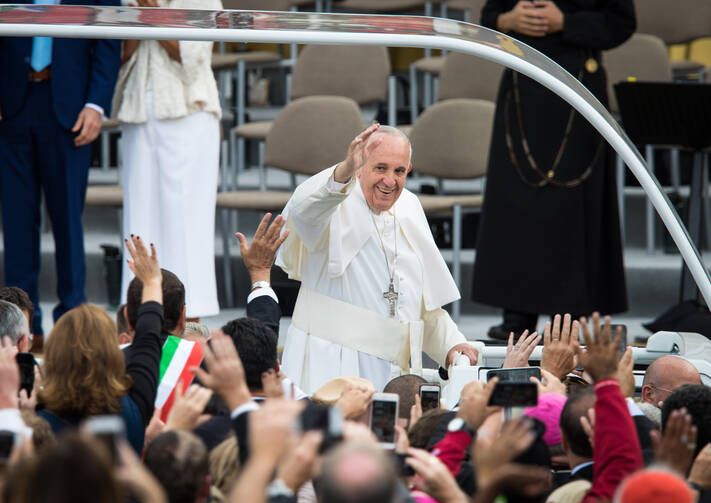Our church has attracted many headlines in recent months. In May we had the publication of Pope Francis’ encyclical “Laudato Si’,” which studied the environment and oftentimes adverse impact of human activity on it. In September we welcomed Francis to the United States, with his addresses to Congress and to the United Nations, many prayer services and parades and visits to prisoners, the homeless, religious women and hundreds of thousands at Philadelphia’s World Meeting of Families. Millions watched and cheered these events. In October Francis presided over the meeting of the Synod of Bishops on marriage and the family.
All of this is in addition to constant stories about Pope Francis going about his daily mission with simplicity and humanity. The man has broken down old barriers, opened new doors, given the papacy a refreshing new image. Some cringe. Others complain. Most applaud.
“Laudato Si’” raised hackles in some quarters and in others became a rallying point. Who is the pope to be writing about science? What does he know? This contrasts, of course, with feelings of relief and support—thank heavens someone of the pope’s stature is speaking up. God made us stewards of his creation, not owners and exploiters. Twenty-eight protesters arrested last August as they tried to stop construction of a natural gas storage faciliity in Seneca Lake, N.Y., carried a huge mockup of the encyclical and proclaimed, “Pope Francis, we hear you.”
“The meeting of the Synod of Bishops in October also stirred up strong reactions. The pope’s openness, desire for discussion and drive to hear opposing viewpoints have revealed some rifts usually hidden from public view. The commentary was varied, sometimes contentious. Earlier this year, the commentators were asking, Who is the pope to talk about the environment? What does he know about the economy? Now the questions were, Is he trying to change marriage law? Is he trying to change doctrine? Others thought the pope was not going far enough; they asked whether the pope’s “revolution” is more than a series of inventive gestures. Most commentators, however, were ready for a thorough examination of what is essential and what might be longstanding but negotiable.
It was Pope Francis’ six days in Washington, New York and Philadelphia that drew particularly heavy attention throughout the United States, almost all positive. His smile was contagious. People on the streets acted more friendly. Televisions in bars followed the papal parade through Central Park. TV news celebrities confessed their onetime religion. The Catholic Church was in.
What can we do with this energy and interest? Discussions and disagreements will continue, though perhaps not with the intensity of the reactions to the synod. But what about the good will and optimism that the pope’s U.S. visit generated? Where can it take us?
One area we all have to work on is civility in discourse and disagreement. Around the time of the synod, Pope Francis spoke much about listening, speaking and allowing others to speak. That meeting generated some heated talk, angry words, suspicion and discord. Bishops disagreed with each other in public. That is not bad if it is done with respect and desire for truth. Any one of us can reach out to someone we disagree with, sit down over a cup of coffee and find what core values we share. Not a bad start.
We can reach out to Catholics who have not found life in the church and have drifted away. How can we accompany them? Do they have something to say that we need to hear? Let them speak! Let us listen!
We cannot wait for church officials to move before we do. Bishops, pastors and parish staffs already have their hands full. Individuals and small groups within parishes need to take the initiative to find new projects or structures that will help build on what we have in order to proclaim the Gospel in new ways to our very new world. They must support their parishes as they also rightly challenge them.
One powerful image from the pope’s visit is a video on America’s website that shows some of the Jesuit high school students who traveled to Philadelphia to see the pope—about 400 of them from 40 schools. What more can our schools do?
We must not fail to recognize and lift up what we do accomplish—in everyday parish life, of course, but also in a rich variety of ministries. At the annual Ignatian Family Teach-In, students from Jesuit schools raise awareness of important issues. Catholic Extension gives essential support to the church in rural America.
And in the end, let us be thankful. For the challenges we face. For the faces and the words on our websites. For the students in our schools. For our leaders. For communities gathered in our local churches. For families that come home each day to love and support one another. For Pope Francis. And for all the good things we do.








